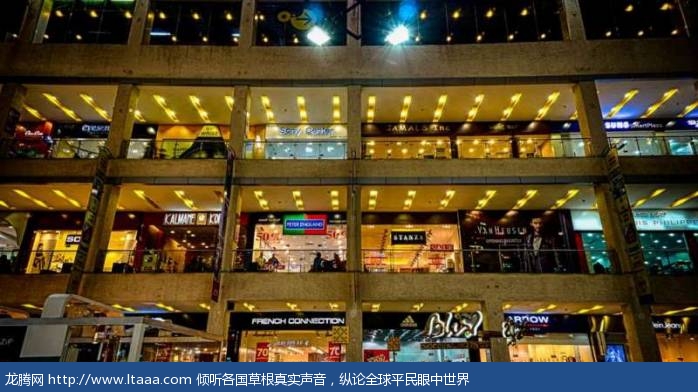华丽的背后,印度零售业员工面对工作压力 [印度媒体]
孟买:Muzammil Shaikh伸着腿坐在孟买北郊莫伦达一家商场停车场出口的旁边,他的同事们站在附近,一些在抽烟,另一些在玩手机,所有的人都不在意旁边垃圾堆的恶臭。但是21岁的Muzammil害怕不得不回到商场,因为他接下来将在那里连续站立四个小时。
Mumbai: Muzammil Shaikh sat with his legs outstretched, by the exit of a parking lot of a mall in Mulund, a northern suburb of Mumbai. His colleagues stood nearby, some smoking, others using their phones, all oblivious to the stench of garbage. But 21-year-old Muzammil was dreading having to return to the mall, where he would be standing continuously for the next four hours.
孟买:Muzammil Shaikh伸着腿坐在孟买北郊莫伦达一家商场停车场出口的旁边,他的同事们站在附近,一些在抽烟,另一些在玩手机,所有的人都不在意旁边垃圾堆的恶臭。但是21岁的Muzammil害怕不得不回到商场,因为他接下来将在那里连续站立四个小时。
“I was just wondering what kind of a mess I’ve got myself into,” he said.
“我不知道为什么我把自己搞成这个样子,”他说道
Shaikh moved to the city two years ago from a village near Tirupati in Andhra Pradesh. He thought a steady job would help him fund his education and support his parents. Instead he has been working as a salesman, earning Rs 10,000 a month, and living in a slum in Kurla. He and his brother spend about Rs 2,500 on rent for a house that is a fraction of the size of the one in his hometown.
Shaikh两年前从安德拉邦蒂鲁帕蒂附近的一个村庄来到孟买。当时他觉得一个稳定的工作能帮他赚钱解决教育问题同时赡养他的父母。但现在他却一直在做销售员的工作,每月挣10000卢比(1人民币元=10印度卢比),住在库拉尔的贫民窟。他和他兄弟两人化2500卢比租了一个只有他家乡房子几分之一大小的房子。
“I can barely save any money to send home,” Shaikh said. “I have to finish my graduation soon and try to get a job in a good company. I did not think it would be so bad.”
“我几乎存不下什么钱寄给家里,”Shaikh说道,“我要尽快完成我的教育并设法在一家好的公司找个工作。之前我没想到情况会那么差。”
No overtime
没有加班费
India’s organised retail sector employs over 10 million people and is estimated to reach 70 million by 2018. As the penetration of modern retail increases, the formal sector is expected to grow at a compound annual growth rate of 15-20%. That perhaps explains the requirement – as stated in one advertisement – for young, enthusiastic, presentable, chirpy, helpful, salespeople who are a “customer’s delight for each customer each time”.
印度有组织零售业雇佣了超过一千万人,预计在2018年雇员人数年超过七千万人。随着现代零售业的不断渗透,该产业预计将以15-20%的复合年增长率增长。这或许能说明为何零售业需要年轻,热情,体面,活泼,和乐于助人的销售人员----正如招聘广告声明的那样,他们是每位顾客在每次服务中喜欢见到的。
Many young people join the industry hoping it will be a stepping stone in a long career. But few manage to climb the corporate ladder or actually improve their lives.
许多年轻人加入零售业希望这能成为未来职业发展的跳板。但非常少的人能够升迁或真正籍此改善他们的生活。
To put things in perspective, an average male farm hand (ploughing and tilling) in rural India is paid Rs 271 per day, which translates to approximately Rs 8,130 per month. The minimum wage for a sales person, or ‘fashion consultant’, under the Shops and Establishment Act in Mumbai is Rs 8,440 (for skilled labour), Rs 8,040 (semi-skilled) and Rs 7,640 (for unskilled). This includes the basic wage and special allowance. Entry-level salaries for salespersons in Mumbai are between Rs 6,000 and Rs 8,500. Some workers are paid even less than the minimum wage, sometimes without a formal contract or a salary slip to prove their employment.
就事论事地讲,一个印度农村的普通农业帮工(耕田犁地)可以挣271卢比一天,合计一个月挣8130卢比。根据孟买的《商店和公司法案》一位销售人员或“时尚顾问”的最低工资分别是8440卢比(技能工),8040(半技能工),7640(非技能工),这其中包括了基本工资和特别津贴。在孟买销售人员的初级工资在6000卢比和8500卢比之间。有些员工的工资甚至低于最低工资标准,有些时候员工们没有正式的用工合同或者工资单来证明雇佣关系。
To implement “ease of doing business”, the BJP-led Maharashtra state government on June 23, 2015 introduced a self-certification system whereby industries and establishments will no longer to subjected to “inspector Raj” and can issue a certificate affirming that they adhere to labour laws. A notification dated June 1 stated that the license and renewal of license to the contractor under the Contract Labour (Regulation & Abolition) Act, 1970 shall be issued within seven working dates from the date of receipt of application, or else it shall be deemed to be granted. Meanwhile, the Maharashtra government announced that they would allow malls to be open for 24 hours, 365 days a year.
为了实施“商业便利”计划,印度人民党执政的马哈拉施特拉邦政府于2015年6月23日引入了一个自我认证系统,籍此企业和公司就不必接受政府巡视员的审查,可以自己签发一个证书确认他们遵守了劳动法。六月一日发布的一个通告规定根据1970年制定的《合同劳工(管理和废止)法》合同签约人的许可证和更新的许可证应在收到申请的七个工作日内颁发,否则便被认为已许可。同时马哈拉施特拉邦政府宣布他们允许商场全年24小时营业。
Every salesperson in Mumbai works two shifts – either 10.30 am to 8 pm or 12.30pm to 10pm, which is about 9.5 to 10 hours every day. As per section 14 of the Shops and Establishment Act, an employer can make a salesman work for only 48 hours a week (or eight hours a day) and not more than nine hours on any day. Section 63 mandates that when work exceeds eight hours, workers are entitled to overtime wages at the rate of twice their ordinary wages.
在孟买所有的销售人员都两班倒---10.30 am 到 8 pm或12.30pm 到10pm,每天大约工作9.5 到10个小时。根据《商店和公司法》第14章,雇主只可让销售人员每周工作48小时(或每天8小时),每天工作不能超过9小时。第63章规定当工作时间超过8小时后,员工有权要求支付日常工资两倍数额的加班工资。
Of the 31 salespeople I spoke to for this story, none said they received regular overtime payments. This was despite the fact that they worked nearly 12 hours when sales were on. “Sirf aane ka time hota hai, jaane ka nahi,” (‘Only the time we have to come in is fixed, not the time we can leave’) said Kishori, who has been working for 15 years, eight of them in the retail sector.
为了这篇文章我与31名销售人员交谈过,他们中没有人拿到过固定的加班工资。而他们却要在大促销期间每天工作将近12个小时。“Sirf aane ka time hota hai, jaane ka nahi,” (‘上班时间是固定的,下班时间是不固定的’) Kishori说道,他已经工作15年了,在零售行业干了8年。
In desperation, employees switch jobs for as little as a Rs 500 hike in their monthly salary. To minimise obligations, many retail firms outsource the hiring of salespeople to human resources companies. Some agencies also handle payroll.
无奈之下,员工们仅仅为了500卢比的工资增幅而跳槽。为减少义务,许多零售业公司通过劳务公司外包雇佣销售人员。这其中有些机构还负责发放工资。
“The model of outsourcing goes against the workforce in a big way,” a former employee of one recruitment agency said. “One of the main objectives is cost control. Besides, this is a labour surplus market, so there is a lot of demand for jobs. The salary can be kept low as a result.”
“劳务外包模式对劳动者很不利,”一名招聘机构的前员工说道,“外包的一个主要目的就是成本控制,不管怎样,这是个劳动力过剩市场,求职者众多,所以工资可以被压低。”
Physical effect
对身体的影响
Stores rarely provide any seating facility for their retail staff. One manager from the retail industry told me that it is considered “respectful” to stand in front of customers. This has an impact on employees’ health.
商店极少为零售员工提供就坐的设施。一位零售业的经理告诉我,在顾客面前站立服务被认为是恭敬的。但这对员工的健康有影响。
“We usually get middle-aged salespeople who complain of chronic pain, feet and leg oedema or swelling, back pain and varicose veins,” said Dr A B Goregaonkar, the head of Orthopaedics at Lokmanya Tilak Municipal Hospital in Mumbai. “Standing for long hours can affect your posture. The problem is also that these people are standing in one place, and there is no space to walk which could improve blood circulation.”
“来我们医院的那些中年销售人员抱怨慢性痛,腿和脚水肿或肿胀,后背疼和静脉曲张,”孟买Lokmanya Tilak市政医院整形科主任A B Goregaonkar医生说道,“长时间站立会影响到你的姿态。问题是这些员工固定站在一个位置,没有空间走动以便促进血液循环。”
Under the United Kingdom’s Workplace (Health, Safety and Welfare) Regulations, 1992, employers must provide seats for workers who have to stand to carry out their work, if the type of work gives them an opportunity to sit from time to time.
英国1992年颁布的的工作场所(健康,安全和福利)管理条例规定,当某项工作可间或为员工提供坐下的机会时,雇主应为必须站立完成工作的员工提供座椅。
But, union leaders feel that the demand is unreasonable. “If your service requires you to work in a certain way, you cannot complain,” said S K Rege, secretary, Centre of Indian Trade Unions. “For instance, factory workers who work in the chain process of manufacturing also have to stand for long hours. The criteria is that the work should be safe, and that the workman gets a break after five hours of work for at least half an hour.”
但工会领袖们觉得此项要求不尽合理,“如果你的服务要求你以某种方式工作,你就不能抱怨,”印度工会中心的部长S K Rege说道,“比如说,在工厂生产流水线上工作的工人也要长时间站立,衡量的标准应是工作必须是安全的,同时劳动者五小时工作后应至少能休息半小时。”
‘Rules worse than being in school’
规章制度比学校还严格
Adding insult to injury, retail workers are subjected to strict rules that make schools pale in comparison. “When we enter the mall, they first take our phones,” said Nazneen, a 30-year-old graduate who works as a supervisor of a cosmetic brand, and has been in the industry for 11 years. “Then they check us from head to toe. They enter the details of what we have on our body. For instance, if there is cash, they write it down. Since eating is not allowed, even if they find a chocolate wrapper on us when we step out, they fine us Rs 500 as a deterrent. School se bhi jyada kanoon hai.”
雪上加霜的是,零售业员工要遵守比学校还严格多倍的规章制度。“当你进入商场后,他们首先拿走你的手机,”Nazneen说道。Nazneen现年30岁,是一位大学毕业生,在一个化妆品品牌做主管,入行已11年了。“然后店方把你从头到脚检查一遍,你随身携带的东西他们都要知道,比如说,你随身带有现金,他们就把数额记下了。由于不让吃东西,当你离开时即便是在你身上发现一张巧克力包装纸,他们会罚你500卢比作为一次警告。”
Employees are held responsible for shrinkage or wastage, which includes merchandise that goes missing. Entrepreneur Nikhil John, 31, who worked in a sports mega-store in Thane while developing a business idea, said he was offended by the way he was body-searched when entering or leaving the premises. “No customer, who can also potentially steal items, was ever checked,” he said. “It used to upset me that the owners trusted the customers more than us.” John runs a recruitment site now.
员工还要为短数或损耗负责,这其中包括丢失的商品。 曾在塔娜的一家大型体育用品商店工作过并在那里想出了一个商业创意的31岁创业者Nikhil John表示他觉得进出商场时搜身很冒犯,“顾客们同样存在偷窃的可能,但从未被搜身,”他说道,“想到老板更信任顾客而不是员工时觉得很沮丧。”John现在经营一家招聘网站。
A cashier in a prominent home furnishing store said that he has had to pay out of his pocket for counterfeit notes he inadvertently accepted. “During sale time, it is so crowded that it’s impossible to check every note,” he said. “I have paid three times this year – about Rs 3,000 in total – for accepting fake notes.”
一家着名家居商场的一名收银员说他必须赔付自己不小心收到的假钞。“在大促销期间,人群非常地拥挤,所以不可能检查每张钞票,”他说道,“我今年为收到的假钞赔了三次---总共约3000卢比。”
There is no “office space” or even a separate room for staff. Malls usually provide an overcrowded canteen. Nazneen claims that the canteen in the mall where she works is so tiny that salespeople sometimes eat standing up. In addition, they are compelled to spend their other breaks outside the mall premises.
员工们没有“办公空间”甚至没有一个单独的房间供员工使用。大商场通常提供一个非常拥挤的食堂。Nazneen说他工作的那家商场的食堂太小了以至于销售人员有时不得不站着吃饭。此外,他们被迫在商场外面打发工作中间的休息时间。
“Even if we sit on the benches outside the mall, we’re sent away. They won’t let us stand in the passages either,” said Priyanka, a 38-year-old who has worked for over 10 years in retail. “The mall is only for customers.”
“即便我们坐在商场外的长凳上也会被轰走,公司也不让我们在商场通道内呆着,”38岁在零售业已工作了10年的Priyanka说道,“商场是顾客的商场”
Toilets meant for customers are also sometimes out of bounds. “My juniors change in the toilets meant for customers,” said Nazneen. “There’s no space in the one changing room given for my girls here. There is usually a long line. The toilets they provide us are also very dirty. If the security people complain [about using the customer toilets], I have to tell them to please let it pass and not let our managers know.”
顾客专用厕所有时也是禁止入内的。“我的下属在顾客专用厕所换装,”Nazneen说道,“给女性销售人员的更衣间太小了,通常要排长队。给我们用的厕所也非常脏。如果保卫人员抱怨(我们使用顾客专用厕所),我不得不请他们放我们一马,不要告诉经理。”
‘Nobody tells us how to handle an angry customer’
没人告诉我们和发怒的顾客打交道
Merit is a term that is bandied about a lot, especially to justify why workers aren’t paid well or promoted. A rare example of merit being rewarded is the story of 25-year-old Suraj. After nine years in the industry, he is now a manager at a sports store in an upmarket mall in Thane. He started out earning Rs 3,500 per month and now makes about Rs 30,000 p.m. Having learnt the workings of the industry, he owns a franchise of another store, which he runs with his family members.
价值是一个可以随意摆布的名词,尤其是在认定员工为什么没有被提薪或升职时。一个罕有的价值得到褒奖的例子是25岁的Suraj。在行业内工作了九年之后,Suraj现在是塔娜一家高档商场中一家体育用品商店的经理了。他的薪水从最初的每月3500卢比涨到了约30000卢比。在掌握了本行业的经营之道后,他自己拥有了在另一家商场内的一家特许经营店,这家店他与他的家人共同经营。
He says enthusiasm is a prerequisite to progress. “One has to study the brand and give the proper information to the customer. We have to dress well, look good, be open to meeting new people, and look fresh for eight hours.”
他说热情是取得进步的必要条件。“你必须了解你的品牌并给顾客提供适当的信息,我们必须穿着得体,外表悦目,要乐于接触新顾客并在八小时内保持精神饱满。”
An education programme manager at an organisation that trains retail employees said that people who were interested in their work did well from it. “An employee needs to learn and then go to the next level,” he said. “Only then will the organisation aid their goals. With many of these people, laziness takes over. Many people join retail as a compulsion and then haven’t done anything for their individual development. You cannot keep switching jobs for a raise of Rs 500.”
一位在一家负责培训零售业员工的机构工作的培训项目经理说那些对自己的工作有兴趣的员工干得都不错。“一个员工需要学习并上升到另一个层次,”他说道,“只有到那时机构才会帮助他们实现目标。但许多销售人员屈服于惰性,许多人是被迫加入零售行业,他们也没有为个人的发展做任何事情。你不应该为了500卢比的加薪而频繁跳槽。”
Whether companies aid the progress of careers is debatable. For instance, a key skill is being able to connect with customers. But while employees are trained in product information, they’re often at a loss when it comes to interacting with customers. “Nobody tells us how to handle an angry customer,” said one of the senior salesperson of a software company. “All we know is that we cannot talk back.”
公司是否为员工的职业发展提供了帮助还有待商榷。比如说,一个关键的技能就是如何与顾客打交道。虽然员工接受了产品信息方面的培训,但当他们和顾客交流时还常常不知所措。“没人告诉我们如何和发怒的顾客打交道,”一家软件公司的一位资深销售人员说道,“我们所知道的就是不能反驳。”
“Many of these jobs are demeaning,” said advocate and labour activist Vinod Shetty. “Employees are literally abused every day, and are not supposed to react. The clock has now turned backward and now there is a steady slowing down of labour laws. Contract labour has entered every field.”
“这些销售工作中许多是有损人格的,”劳工活动家和提倡者Vinod Shetty说道,“雇员实际上每天都受到虐待,并不允许回应。历史车轮在倒退,现在关于劳工的法律在逐步消退。契约劳工已进入新的领域。”
Lacking training and preoccupied with making ends meet, the motivation to climb the ladder is very low. “They just stay poor,” said John. “It’s impossible for them to grow. They have no option but to continue working where they work. They cannot think of making any investment. They cannot think about what they can do next, as they are just so tired. Some of these boys were in such bad circumstances, I wondered how they even smiled.”
缺少培训且忙于避免经济上的入不敷出使得员工的职业发展积极性非常低。“他们只是陷于贫困,”John说道,“他们不可能成长。他们没有选择,只得继续他们的工作,他们不可能想着去做任何投资,他们也不可能想他们下一步能做什么,他们太辛劳了。他们中有些男孩子们处境非常糟糕,我想不出他们居然还能微笑。”
(The names of most salespeople have been changed on request)
文中绝大多数的销售人员应要求使用了化名
Menaka Rao is a freelance journalist based in Mumbai
Menaka Rao是一位常驻孟买的自由撰稿人。
版权声明
我们致力于传递世界各地老百姓最真实、最直接、最详尽的对中国的看法
【版权与免责声明】如发现内容存在版权问题,烦请提供相关信息发邮件,
我们将及时沟通与处理。本站内容除非来源注明五毛网,否则均为网友转载,涉及言论、版权与本站无关。
本文仅代表作者观点,不代表本站立场。
本文来自网络,如有侵权及时联系本网站。
图文文章RECOMMEND
热门文章HOT NEWS
-
1
चाइना में रेडी और ठेले Local shops in china || L...
- 2
- 3
- 4
- 5
- 6
- 7
- 8
- 9
- 10
推荐文章HOT NEWS
-
1
चाइना में रेडी और ठेले Local shops in china || L...
- 2
- 3
- 4
- 5
- 6
- 7
- 8
- 9
- 10











